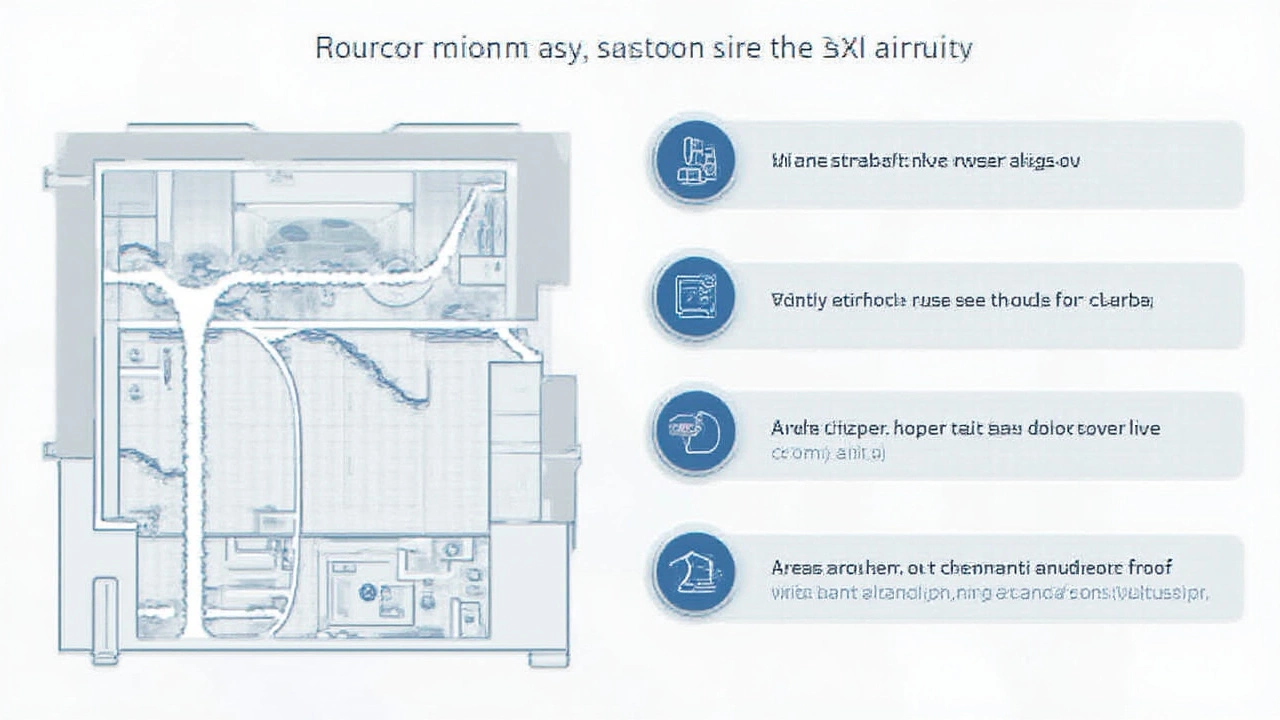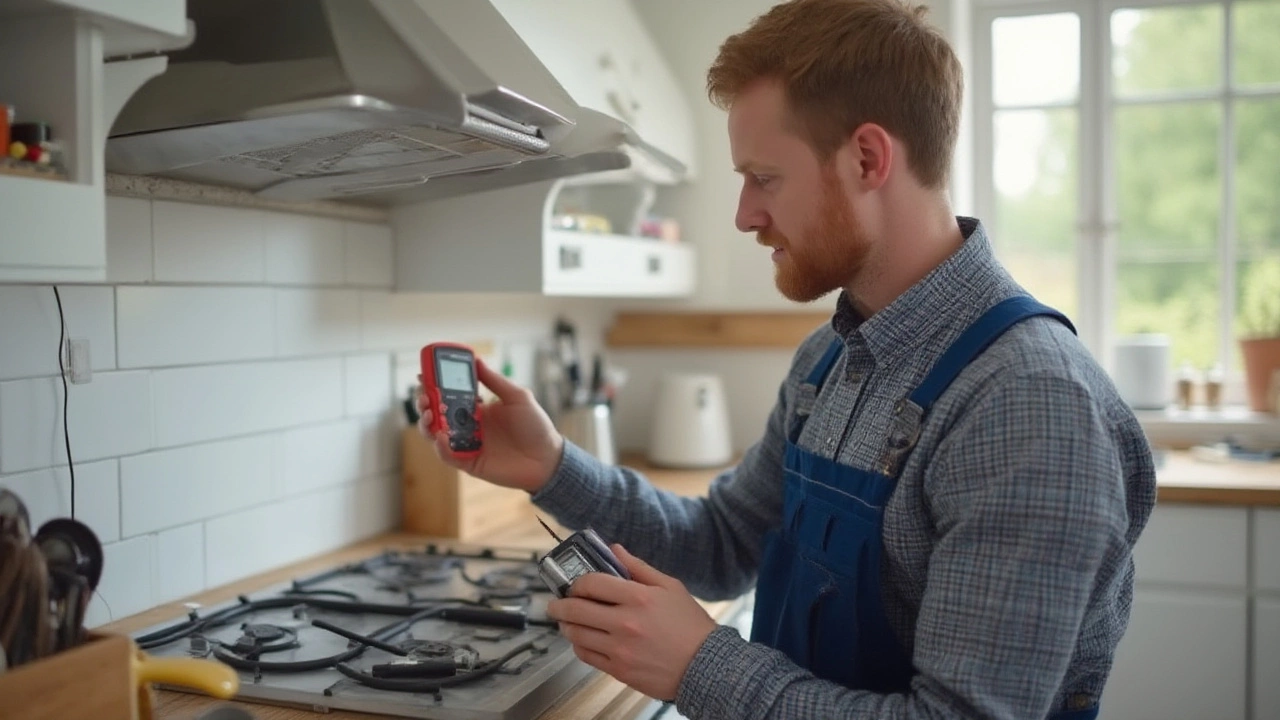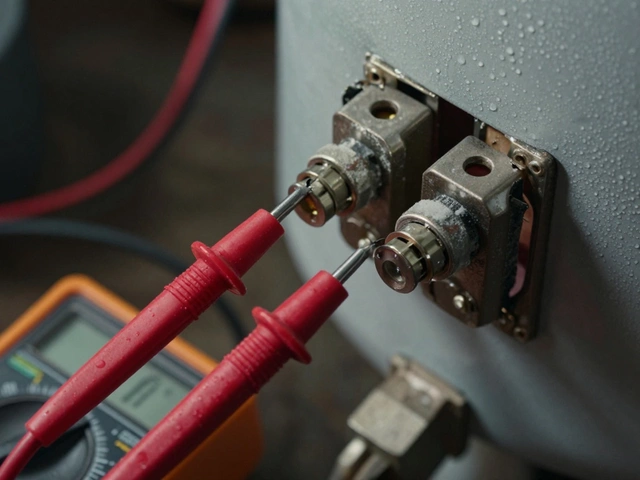Have you ever switched on your kitchen or bathroom fan and noticed nothing but a whirring noise—or worse, dead silence? Before you start panicking about hidden mold or mounting repair bills, it’s worth knowing exactly who you can call when your extractor fan quits on you. There’s a lot of confusion about which trade sorts out these noisy (or silent) gadgets. Most folks assume there’s one clear answer, but the reality is a lot more interesting. Sometimes the electrician is your go-to, sometimes not, but let’s clear away the cobwebs and get to the truth.
What Exactly Does an Electrician Do?
Everyone has a mental image of electricians rewiring houses, fixing circuits, or rigging up fancy new light fixtures. But their role stretches way beyond flickering bulbs. Certified electricians are trained to handle a load of tasks that mid-level DIYers wouldn’t dare touch, mostly because anything higher voltage than a toaster turns risky fast. According to the UK’s NICEIC (National Inspection Council for Electrical Installation Contracting), an electrician is required any time you’re dealing with fixed wiring—meaning anything hardwired into your home. That covers the majority of extractor fans, which are usually hooked up directly to an electrical circuit and switch, especially in bathrooms and kitchens.
Extractor fans often hide inside ceilings or high on the wall, drawing out moisture, odors, or even the smoke after you burn that toast for the third time in a week. If the fan’s not coming on, is making strange noises, or the light isn’t working (a feature on some newer models), most electrical problems should be handled by someone with the proper qualifications. According to Electrical Safety First, nearly half of accidental domestic fires in the UK are caused by faulty electrical products, and a chunk of those trace back to botched ‘simple’ repairs.
Electricians are not just for emergencies—many property owners call them for fan installations or for planned upgrades, like switching to a more powerful, energy-efficient model. Professional wiring keeps you compliant with the current wiring regs (BS 7671:2018 for UK readers), which insurance companies love—and dodgy fixes will just void your policy. Trained professionals also spot underlying issues with the circuit feeding your fan; you don’t want to risk blowing fuses every time you shower. If your fan won’t switch on, a qualified electrician will know whether it’s the fan itself, the wiring, or sometimes even a broken pull cord or switch. Some electricians even carry spare fan motors and replacement parts in their vans for common brands like Vent-Axia, Manrose, or Xpelair.
What Kind of Extractor Fan Problems Can an Electrician Fix?
So what sort of fan fails is an electrician supposed to fix, exactly? For a start, any situation involving wires, poor connections, or electrical controls is fair game. If your fan won’t power up at all, that usually hints at a dead motor, a broken connection, or a faulty switch—all right up an electrician’s alley. Maybe your fan spins but doesn’t sound right. A grinding or rattling noise often points to a worn-out motor bearing or a loose impeller. Again, this kind of repair slips neatly into the electrician’s portfolio, since it involves taking apart the housing, checking the wiring, and safely grounding the motor during repairs.
Common bathroom issues include fans that run constantly, even when switched off. Here, a stuck timer or shorted live feed might be the culprit, so you’ll need someone who understands the wiring diagram. Electricians can test with multimeters and insulation resistance testers—tools most people don’t have handy. Sometimes fans develop issues after loft insulation or redecorating. Paint splatters, blocked grilles, dust buildup on bathroom sensors—the list goes on. You might even find that your fan is wired to come on with the bathroom light switch and turns off a few minutes after the light—a delay timer. If the timer’s faulty, it’s not a job for the average DIYer. It can even present a shock hazard if connected incorrectly.
Another overlooked scenario: replacing your old fan with a newer, energy-saving model. Modern extractor fans use less power and remove more air, but they often need rewiring or different connections. Some new models come with humidity sensors or smart controls. Electricians are trained to check for compatibility and ensure your home circuit can take the new load, especially if you’re swapping a basic fan for a high-tech one. Ever wondered why your fan stops working after a big rainstorm? Sometimes, external hoods or ducting fill with water, shorting out the motor—another situation for someone with a bit of electrical and practical know-how.

When Should You Call an Electrician for Your Extractor Fan?
It doesn’t always make sense to pick up the phone every time a fan squeaks. But there are situations where calling a pro is non-negotiable. Let’s break down when you need an electrician—no negotiation:
- Fan doesn’t switch on/off: Total silence, no response, or a fan that runs regardless of light switch signals a circuit or switch issue that’s probably not DIY-friendly.
- Strange electrical smells or buzzing sounds from the fan or switch—these can point to arcing behind the wall or melted insulation.
- Fuses keep blowing whenever you use the fan, especially if you’ve tried replacing the fuse and the problem persists.
- Evidence of water ingress, like visible damp patches or droplets near your fan’s housing. This often points to failed seals and possible shorts.
- You’re upgrading to a fan with different power requirements, like a smart fan, dual-speed fan, or one with integrated lighting and timers.
An electrician will isolate the circuit, check wiring for shorts, and, if need be, rewrite part of your bathroom or kitchen circuit. Then there’s the compliance factor: many local regulations require a certified electrician to sign off on new installations or major repairs in “wet” areas (bathrooms, kitchens). DIY work can void your home insurance, especially if anything goes wrong afterwards.
| Common Extractor Fan Issues | Who Should Fix It? |
|---|---|
| Fan won't turn on | Electrician |
| Motor failure | Electrician |
| Noisy operation | Electrician (if wiring/motor related) |
| Damaged or blocked ducting | Handyman or ventilation specialist |
| Broken grille/cover | DIY or handyman |
| Fan not removing air properly | Electrician (if booster is needed) or ventilation specialist |
If you’re a renter, check your lease—some landlords prefer using their own tradespeople for liability. Homeowners, it’s wise to ask for the electrician’s certification and make sure they’re registered with a body like NICEIC or NAPIT (in the UK) or your local equivalent. That way, you know your repairs are legitimate and safe.
When Might You Need a Different Specialist?
Electricians don’t handle every extractor fan problem. If your fan seems electrically fine—the switch works, no strange noises or burning smells, but there’s barely any airflow—you could have a different issue:
- Your ducting might be blocked by dust, masonry, or even birds nesting in the external vent. This is especially common in older homes with flexible ductwork or long vent runs.
- The external cover or grille is missing or damaged, letting debris (or critters) inside.
- The fan blade itself is clogged up with grime, dust, or lint, especially in kitchens where grease builds up quickly.
- The backdraft shutter (the flap that closes when the fan’s off) is stuck. This happens often when paint or gunk jams it during redecorating.
These are typically jobs for a handyman or ventilation specialist, not an electrician. Some companies specialize in cleaning and servicing extractor fans—helpful if you live in a flat or high-rise where access can be tricky. If you do decide to have a go yourself, always cut power at the mains before unscrewing anything. It feels silly, but you’d be surprised how many accidents happen with folks thinking 'it’s only a fan.'
Kitchens, by the way, have their own special rules. If your range hood cooker extractor is the problem, repairs split depending on the issue. Electrical faults—wiring, blown lights, or power failures—need an electrician. But filters, bulbs, and fan blades can often be changed by any handy adult. The range hood market is huge, delivering about $25 billion annually worldwide, so manufacturers tend to offer lots of DIY-friendly spares and instructions.

Handy Tips for Extractor Fan Maintenance
If you want your extractor fan to last, a bit of love goes a long way. Fans are easy to ignore when things are working, but a quick check every season seriously reduces the chance of a sudden, weird-smelling meltdown at the worst time.
- Every few months, wipe down the outside grille or cover using a damp cloth and mild detergent. For kitchen fans, make this a monthly habit—grease builds up shockingly fast.
- Clean or change any removable filters as per your manufacturer’s instructions. Most bathroom fans don’t have filters, but some fancy models do, especially in flats or homes with tricky ductwork.
- Test your fan each week by running it for a minute or two and listening for weird rattles or whines. If the noise level changes, the bearings could be on the way out.
- If you notice condensation or steam lingering after a shower, check that the fan is actually spinning—sometimes a fuse blows or the wiring shakes loose without anyone noticing.
- Don’t ignore odd electrical smells, hot switches, or flickering. These are classic red flags. Hit the switch, call a pro, and don’t take risks.
Bigger properties with several fans typically benefit from an annual inspection, especially if you’re in a home that’s over 30 years old. Older wiring can corrode, especially in moist spots like bathrooms. If your fan’s over a decade old, think about replacing it. Today’s models use about 60% less electricity and do a far better job shifting humid air outside, which seriously helps with mold and mildew prevention.
Some folks may wonder if smart fans are just another gadget gimmick. Truth is, humidity and air quality sensors are quickly becoming standard—they save money, prevent mold, and even help allergy sufferers, which comes in handy with the global asthma spike (the World Health Organization says cases have doubled since 2012).
Finally, keep your fan’s paperwork somewhere handy—if you ever sell your place or have major work done, a written record of electrical checks helps with valuation and insurance.
So the next time your extractor fan throws in the towel, skip the panic and ask: is this a job for a electrician or someone else? Nine times out of ten, if there are wires, the answer’s clear. Take care of your fans, and they’ll quietly take care of you for years to come.







